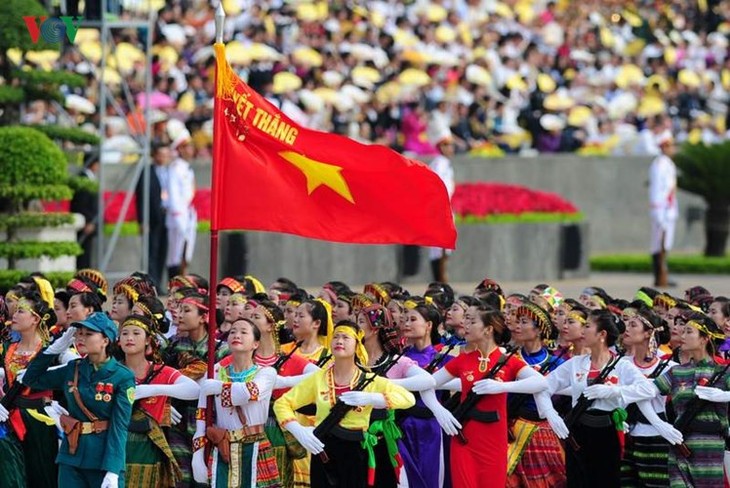(VOVWORLD) - The armed groups which attacked the headquarters of the People's Committee of Ea Ktur and Ea Tieu communes, Cu Kuin district, Dak Lak province, on June 11 have been arrested and will be investigated and prosecuted according to the law. But hostile forces have been taking advantage of the case to incite sabotage, cause instability, and call on other countries and international organizations to intervene in Vietnam’s internal affairs. They have distorted Vietnam’s efforts to ensure that all ethnic groups are equal, united, and respected to develop together.
 All ethnic groups in Vietnam are equal, united, respected to develop together All ethnic groups in Vietnam are equal, united, respected to develop together |
Hostile forces have always attempted to propagandize, entice, and incite ethnic minorities to demand secession and self-rule, and to establish the so-called "Dega State" or " Dega State of the Highlands", separating the Central Highlands from Vietnam’s great family of ethnic groups and Vietnam's territorial sovereignty and turning the Central Highlands into an unstable "autonomous" region to build an “independent state”.
Hostile forces have always provoked conflicts to create "conflict hotspots", destabilized security and politics, divided the great national unity bloc, and created pretexts to intervene in Vietnam’s internal affairs.
All ethnic groups in Vietnam are siblings
Although the hostile forces have used all possible means to divide the great national unity bloc, it has not changed the fact that all 54 ethnic groups in Vietnam are siblings. 77 years ago, in a letter sent to the Congress of Southern Ethnic Minorities in Pleiku, Gia Lai province, on April 19, 1946, President Ho Chi Minh wrote: "The Kinh or Thổ, the Mường or the Mán, the Gia Rai or the Edê, the Xê Đăng or the Ba Na and other ethnic minorities, are all Vietnamese descendants and are all siblings”.
Continuing Ho Chi Minh's thought on great national unity, the Communist Party of Vietnam has pursued a consistent policy of strengthening the great national unity on the basis of ensuring the equality of all ethnic groups and promoting solidarity, respect, mutual support, and co-development.
The Platform for National Construction in the Transitional Period to Socialism (revised in 2011) affirms a determination to constantly strengthen national unity, the unity of the Party, the unity of the people, and international solidarity; ensure equality, solidarity, respect, and mutual assistance among ethnic groups; and create conditions for ethnic groups to develop together in line with the development of the Vietnamese ethnic community. The document of the 13th National Party Congress also affirms the importance of ensuring that all ethnic groups are equal, united, and respected, and grow together.
Vietnam has adopted mechanisms to promote positivity and self-reliance, socio-economic development, and multi-dimensional, sustainable poverty reduction in ethnic minority regions. Vietnam has paid attention to upholding the role of prestigious people in ethnic minority communities and strictly handling plots and acts meant to divide or destroy the great national unity bloc.
Ensuring equality, solidarity, respect, mutual assistance among ethnic groups
The Vietnamese Party and State consider strengthening the great national unity in the Central Highlands region a crucial task because the region holds great strategic importance in terms of economics, society, national defense, security, and foreign affairs.
Socio-economic development policies have been implemented to improve the material and spiritual life of ethnic minorities in the Central Highlands. To reduce poverty sustainably, Gia Lai, Kon Tum, and Dak Lak province have implemented a campaign to change the ethnic minority people’s way of thinking. Lam Dong province promulgated a Resolution on the development of ethnic minority areas until 2025, with a vision to 2030. Kon Tum province has a resolution on preserving and promoting the values of the traditional crafts of local ethnic minorities until 2025, with a vision to 2030.
Central Highlands provinces have particularly focused on the sustainable development of hamlets with a large number of ethnic minorities, providing financial support for ethnic minority students, enabling them to borrow capital for production and business, and building a contingent of ethnic minority cadres.
Local authorities have paid special attention to the conservation, restoration and promotion of traditional culture, belief, and religious values and activities in the Central Highlands, closely linking activities to build a better life with socio-economic development and new rural development.
Thanks to prompt policies, the economy in the Central Highlands provinces has grown steadily and the people's living standard has improved. Between 2015 and 2020, Dak Lak’s economy grew 9% per year and the average poverty rate was 2.8%, while in Kon Tum the economy grew 9.7% and the average poverty rate was 4%. Dak Nong province’s economy grew 8% per year and the average poverty rate was 12% lower than in 2016. In Lam Dong province, the economy grew 8% per year and the average poverty rate was 1.7%.
Effective implementation of policies on religion and ethnic affairs in the Central Highlands has raised the people's feeling of solidarity, thereby defeating the plots of division and incitement of hostile forces.
The policies, guidelines, and important decisions on religion and ethnic affairs, socio-economic achievements, and freedom of belief and religion in the Central Highlands are strong evidence against the accusations and distortions of hostile forces, who accuse the Vietnamese Party and State of abandoning compatriots and discriminating against ethnic minorities in the Central Highlands.